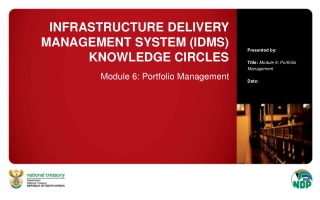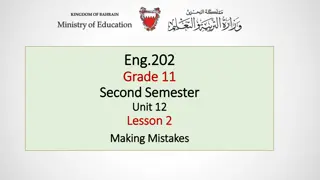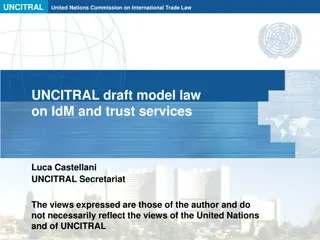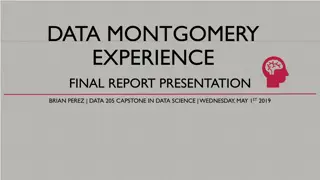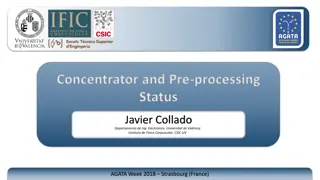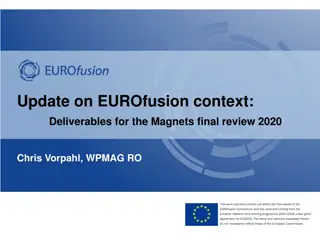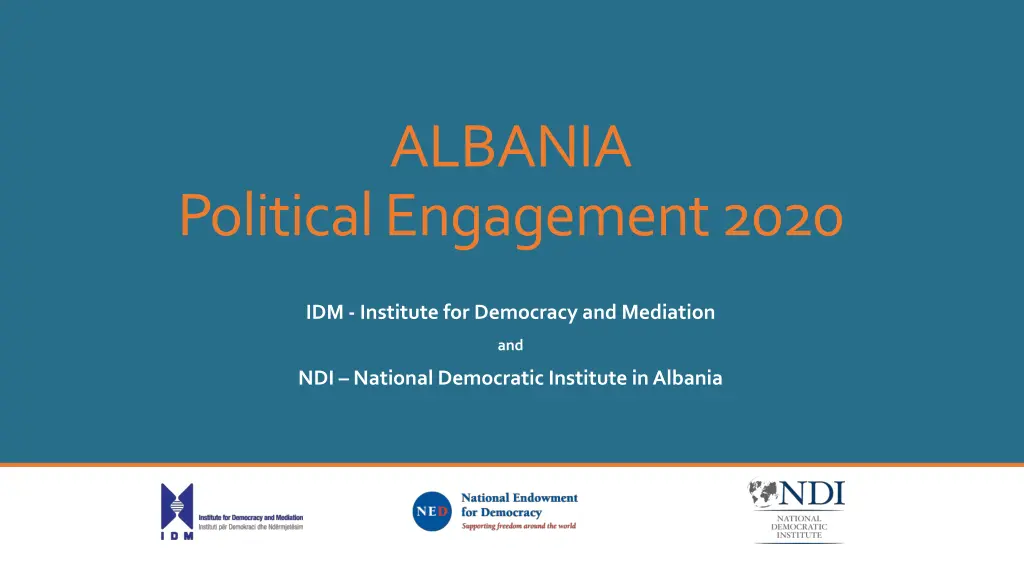
Albania Political Engagement Survey 2020 Findings
Discover key findings from the 2020 Political Engagement Survey in Albania conducted by the Institute for Democracy and Mediation (IDM) and the National Democratic Institute (NDI). Learn about citizen engagement levels, knowledge, interest, efficacy, and perceptions of political institutions. Gain insights into survey methodology, sampling data, and distribution by region, gender, age groups, settlement, and education levels. Find out how Albanians perceive government and politics based on the survey results.
Download Presentation

Please find below an Image/Link to download the presentation.
The content on the website is provided AS IS for your information and personal use only. It may not be sold, licensed, or shared on other websites without obtaining consent from the author. If you encounter any issues during the download, it is possible that the publisher has removed the file from their server.
You are allowed to download the files provided on this website for personal or commercial use, subject to the condition that they are used lawfully. All files are the property of their respective owners.
The content on the website is provided AS IS for your information and personal use only. It may not be sold, licensed, or shared on other websites without obtaining consent from the author.
E N D
Presentation Transcript
ALBANIA Political Engagement 2020 IDM - Institute for Democracy and Mediation and NDI National Democratic Institute in Albania
The National Democratic Institute (NDI) commissioned the Institute for Democracy and Mediation (IDM) to conduct the second survey of Political Engagement in Albania. The first survey was conducted in 2016. Objective The survey assessed the level of citizen engagement in democratic processes fromvoting tociviccampaigns--andmeasured changes in the degree ofparticipationsince2016. The survey is modelled on the Audit of Political Engagement designed by the United Kingdom s Hansard Society to measure level ofpoliticalengagement. The survey is funded by the National Endowment for Democracy (NED). The views expressed in the survey do not necessarily reflect thoseofNDIorNED.
Knowledge and interest How much citizens feel they know about politics and political institutions, and how much they are interested in the issues/institutions. Core indicators of engagement Engagement and participation The extent to which citizens are participatinginabroad rangeofpoliticalandcivicactivities/initiatives. Efficacy and satisfaction The extent to which citizens believe that politically engagement can bring change, and their level of satisfaction withpoliticalinstitutions. Perceptions of parliament, political parties and political processes Citizen attitudes toward parliament performance, MP accountability, politicalpartyfunding,andvoter participation.
DATA COLLECTION Methodology June 14 July 15 SAMPLING ERROR METHOD 2.5% confidence interval in a 95% confidence level Face to face interview and focus groups (4) SAMPLE TYPE POPULATION Albanian population aged 18+ National representative survey with a stratified sample SAMPLE FRAME Most recent population data from INSTAT (January 2020) STRATIFICATION Within each entity the sample was stratified by region and administrative unit SAMPLE SIZE N= 1,536 distributed in 12 regions, based on the Proportional to Size - method
5. Survey Distribution by Region 1. Survey Distribution by Gender Demographics of Respondents Shkod r 7% 53% Kuk s 3% 47% Lezh 5% 2. Survey Distribution by Age Groups Dib r 4% 33% 30% 25% 12% 1% 18-30 31-45 Durr s 10% Tiran 31% 46-60 61-75 Over 76 Elbasan 10% 3. Survey Distribution by Settlement Fier 10% Urban 64% Berat 4% Kor 7% Rural 36% Vlor 7% 4. Survey Distribution by Education Gjirokast r 2% 23% Up to Elementary 44% High School 33% Higher Education 5
Albanians feel disconnected from government and politics, with two- thirds expressing dissatisfaction with the work of governing institutions and opposition bodies. 2020 Key Findings More than two-thirds say that access to public information is important to them. Citizens want to know who funds electoral campaigns of political parties and candidates and how such funds are spent. Focus group participants believe that such information is kept away from them. Compared to 2016, citizens see more opportunities for engagement with civic initiatives than with political parties. Among undecided voters or those unlikely to vote (comprising 52% of the sample, 44% say that they are not represented by the political parties, followed by 27% who say that parties would not deliver on their campaign promises.
Likelihood of voting declined by 21 percent when compared to the 2016 survey, reflecting disillusionment with governing institutions and opposition bodies. Citizens overwhelmingly feel un-represented by political parties. 2020 Key Findings While citizen engagement has decreased since 2016, Albanians show more readiness to take action on issues that matter to them. Albanians are highly critical of parliamentary transparency in general; 3 out of 10 say that parliament has operated transparently during the Covid- 19 pandemic. Respondents overwhelmingly favor voting for individual MP candidates directly, instead of closed party lists, as a mechanism to diminish party leadership influence and improve parliamentary accountability.
Knowledge and Interest Core indicator
Albanians perceived knowledge and interest in politics dropped by 8% since 2016; however, respondents report increased knowledge of and interest in the role of the presidency. Youth (18-30 years) report the lowest level of knowledge about politics and, together with female respondents, are least interested in politics. Two-thirds of citizens say that access to government information is important to them. Two-thirds say it is important to know where political parties get their money, and how they spend it. Focus group respondents believe that lack of transparency on political finance fuels corruption. Knowledge and Interest
In general, how much do you feel you know about? I know a lot` or `know fairly enough Perceived level of knowledge, 2016 vs. 2020 50% Politics in Albania 42% 51% Local self-government in your municipality/town 46% 41% Government 39% 37% Parliament 35% 32% Role of MPs 34% 28% Role of the President 34% 2016 2020
How interested are you to know about? `very interested and `fairly interested Interest in politics, governing and opposition bodies 60% Local self-government in your municipality/town 53% 48% Government 46% 51% Politics in Albania 42% 40% Parliament 40% 31% Role of the President 37% 35% Role of MPs 36% 2016 2020
How much do you think you know about the following topics? Perceived level of knowledge by age group 60% 50% 50% 48% 51% 44% 44% 42% 45% 40% 39% 43% 43% 40% 36% 36% 36% 35% 39% Youth (18-30 years) report lowest levels of knowledge about political party programs, parliament, and MPs. 33% 34% 37% 38% 38% 31% 37% 33% 30% 30% 29% 29% 29% 23% 22% 25% 20% 18% 10% 0% Politics in Albania Local self - government Government Parliament Role of MPs Role of the President Political Parties Programs of political parties 18-30 31-45 46-60 61-75
Interest in politics, governing and opposition bodies by age How interested are you in the following topics? 60% 56% 55% 52% 55% 51% 47% 50% 49% 46% Youth (18-30 years) report lowest level of interest in political parties and role of MPs 45% 44% 49% 43% 42% 42% 42% 41% 39% 41% 41% 40% 37% 41% 36% 36% 31% 38% 35% 35% 37% 33% 34% 30% 36% 31% 20% Politics is governed by a small number of people and there is no space for talented individuals with integrity. Man, 24, Tirana 10% 0% Politics in Albania Local self - government Government Parliament Role of MPs Role of the President Political Parties Programs of political parties 18-30 31-45 46-60 61-75
How interested are you in the following topics? (level of interest by gender) Interest in politics, government and political bodies by gender 59% Local self - government 48% 51% Government 41% 49% Politics in Albania 35% 46% Women respondents have lower level of interest across all the issues compared to men Parliament 34% 45% Programs of political parties 35% 42% Role of the President 32% 41% Role of MPs 30% 38% Political Parties 28% Male Female
Access to public information: How important is it for you personally? Importance of free access to information in possession of public authorities Not important 6% Don't know 1% Slightly important 12% Very important 32% There is a lack of information and transparency. If there was more transparency people would be more interested and involved in politics. Woman, 24, Fier Neutral 14% Important 35%
Interest in where political parties get their funding and how they spend it How important it is for you to know who is funding election campaigns of the political parties and their candidates? 37% 30% 12% 8% 13% The problem is that party funding is huge and hidden.Part of it is done through big public procurement Woman, 43 , Korca. How important it is for you to know how political parties and their candidates are spending their money during election campaigns? 35% 32% 11% 8% 12% Lack of transparency leaves space for corruption - Man, 18 Fier. Very important Important Neutral Slightly important Not important
Political Engagement and Participation Core indicator
Citizens increasingly look beyond political party avenues to influence government decision-making, such as through CSOs. Engagement and Participation There is a consistent decline in party membership since 2016. NGO membership remains low, but stable since 2016. There is a significant decrease in likelihood to vote since 2016, fueled by distrust in political parties and disconnection from elected representatives. Citizens employed in the public sector are the only group expressing strong likelihood to vote. Civic duty comes up as the most common reason for those likely to vote. Lack of representation by the existing parties and distrust in party ability to deliver on promises are main reasons for not voting. Donating money to a political party is unthinkable for most, driven by a strong belief that parties and the political system are corrupt and unrepresentative.
Membership in political parties and NGOs: Comparison A 12% drop in political party membership since 2016 22% 14% 10% 10% Political party NGO/CSOs etc 2016 2020
If parliamentary election were to be held this week, how likely is it that you would vote? (July 2020) Voting likelihood 2020 vs. 2016 50% 29% 22% 20% 18% 15% 14% 12% 10% 9% I would vote for sure I would probably vote Undecided I probably wouldn t vote I wouldn t vote, for sure 2016 2020
78% 9% Vote likelihood by employment status 2020 Employed in the public sector 12% 53% Retired 36% 12% 47% I will vote because I consider it a moral obligation and a constitutional right. It is a way to ask for accountability from the person you have voted . Male, 43 years old, Durres Student 36% 17% 45% Self - employed 31% 21% 33% Employed in the private sector 45% 20% 43% Unemployed 31% 24% I would vote I wouldn t vote Undecided
In case you would vote for sure, what is the main reason? (892 respondents out of total sample 1536) Reasons for voting / not voting 49% 24% 11% 6% 3% I have voted because I believe that my vote could bring change. I believe that protests cannot bring change if they are not accompanied with voting. I don t believe that involvement in politics can be done only through political parties. There are other ways to be involved, like voluntary work for example Woman, 21, Berat It is my civic duty to raise my voice by voting in election I trust that elections make difference As a member/volunteer of a political party I have to vote It s an opportunity for material gains/potential employment Most likely I will be pressured to go and vote by my employer In case you wouldn t vote or undecided, what is the main reason? (856 respondents out of total sample 1536) 44% 27% 14% 8% 5% I feel that I am not represented by any of the existing parties I don t trust any party will fulfil its promises My vote will not bring any difference Parties don't offer viable programs and policy alternatives Other
Have you done any of the following over the last 12 months? Comparison 2016 vs. 2020 Political/Civic engagement over the past 12 months 36% Contacted a local councilor or local municipal 25% 32% Participated, as a volunteer, in an activity in your 17% 26% Contacted an MP, a Minister or other high-level 13% 25% Taken an active part in a campaign, demonstration A significant drop in most forms of engagement since 2016 8% 23% Participated in a meeting of the municipality 13% 23% Expressed opinion or discussed politics on the 21% 18% Sought information from state organs according to 10% 17% Taken an active part in a citizen led campaign, 16% 12% Created or signed a petition online or offline 16% 12% Alerted the media (newspaper, radio or TV) about 5% 11% None of the above 44% 2016 2020
Over the last 12 months have you done any of the following? Which are the 3 MAIN ACTIONS you would be ready to do if you felt strongly enough about an issue? Actual engagement vs. willingness to engage - 2020020) 25% Contacted a local councilor or local municipal officer, or 40% 21% Expressed opinion or discussed politics on the Internet 14% 17% Participated, as a volunteer, in an activity in your local 28% 16% Taken an active part in a citizen led campaign, 29% 16% Created or signed a petition online or offline 20% 13% Participated in a meeting of the municipality council, 27% 13% Contacted an MP, a Minister or other high-level public 37% 10% Sought information from state organs according to the 15% 8% Taken an active part in a campaign, demonstration or 10% 5% Alerted the media (newspaper, radio or TV) about the 20% 44% None of the above 17% Real engagement Potential engagement
What is the main reason for you not to participate or take action? Reasons for lack of engagement over the past 12 months Politicians are just out for themselves 40% I m not given the opportunity to have an influence 22% What does not motivate me is that the voice of the citizens is not being heard at all. Female, 35 years old, Korca Nobody listens to what I have to say 21% I m not interested in influencing decision making 9% I don t have enough information 7%
To what extent, if at all, would you be willing to engage: The less personal the cause, the lower the likelihood to engage 68% 68% 52% 37% 35% 31% 21% 21% 18% 13% 8% 7% 7% 4% 4% 3% For a cause you believe in but does not relate to you personally For an interest you share together with other citizens/your community To support family and friends Your own personal interest/benefits To a Great Extent Somewhat Very Little Not at All
Which of the following actions can help changing the situation you are not happy with at a local or national level? Compared to 2016, Albanians are more likely to engage with civil society initiatives through social media and online petitions and less likely to join a party. 58% Drawing media attention to a problem 54% Taking part in organized citizens initiatives through signing petitions 52% 48% or participating in public debates 50% 51% Voting in election (both parliamentary/local election) Engaging with NGOs dealing with politics, legislature, human rights, through internet/social media, online petitions, Facebook 34% 22% 31% Contacting MPs/local councilors 24% Participating in parliamentary committee sessions or meetings of 16% the municipal council 14% Joining a political party 20% 13% Taking part in rallies organized by political parties 2020 2016
Donating money to political parties Would you consider donating money to a political party in Albania? Political parties spend their money in buying votes Man, 45, Dib r Don't know 11% Funding of parties is directly linked to corrupt business practice. Business that donate have links with political parties and do so for benefiting from public contracts Man, 25, Tirana Yes 4% Yes 4% No 85%
Efficacy and Satisfaction Core indicator
Efficacy and Satisfaction Sixty to seventy percent of Albanians are dissatisfied with the performance of state and political bodies. Citizens feel that they can exert slightly more influence on decision- making at the local rather than at the national level. The Electoral Reform Agreement of June 2020 is seen more as a party-protection measure than as a reform addressing the public interest.
To what extent you are satisfied with the current work of: Satisfaction with governance 71% 69% 61% 60% 59% 26% 25% 22% 20% 19% 18% 13% 10% 8% 7% Parliamentary opposition Opposition outside of parliament President Parliament Government Satisfied Neither satisfied nor dissatisfied Dissatisfied
How much power to influence, if any, do you feel you personally have over decision-making at: Perceived influence on decision making at local and national levels 55% No influence at all 44% 24% Not very much influence 31% 14% Some influence 18% 3% A great deal of influence 4% At national governance level (government and/or parliament) At local governance level in your area (e.g. decisions of the local municipality council)
On June 5, 2020 political parties reached an agreement about the electoral reform. To what extent to you agree or disagree with the following statements about the agreement? Assessment of the June 5th electoral reform agreement The agreement reflects only the interests of political parties 48% 22% 17% 13% Younger respondents (18-30) were less likely to agree that June 5th Agreement represents the interest of citizens and more likely to say that it represents the interest of political parties. The agreement is reached to the best interest of Albanian citizens 17% 20% 49% 13% Agree Neither agree nor disagree Disagree Don't know
Parliament and Elected Representatives Core indicator
Parliament and Elected MPs Citizens are highly critical of parliament s work over the past 12 months. Eighteen (18) percent of respondents consider parliament as essential to our democracy in 2020--a 35% drop as compared to 2016. Citizens are, however, more divided on the performance of parliament during the Covid-19 pandemics. MPs are seen as caring more about the interests of their parties than those of their constituents. Albanians want their elected representatives to be educated, connected to their constituency, independent, and honest. The opportunity to vote directly for individual MPs is overwhelmingly seen as the most effective accountability mechanism.
SaHow much do you agree with the following statements : (last 12 months) Views about the Albanian Parliament (last 12 months) 0% 10% 20% 30% 40% 50% 60% 70% 80% 26% Parliament has held the government to account 22% 45% In relation to the parliament, the way MPs are identified, elected and behave is not ethical. We cannot speak about integrity. Only rich people and people that have interest relations to politicians are elected. It is uncommon to see politicians with dignity that are involved in the parliament and that promote their values. Woman, 35, Korca Parliament has debated and made decisions about issues that matter to me 19% 22% 55% 18% Parliament has been essential to our democracy 29% 50% MPs cared more about the interest of political parties than that of citizens 63% 16% 20% Parliament has been transparent to the public in its activities 17% 24% 55% MPs have represented the interest of ordinary citizens such as myself 14% 17% 67% Parliament is made up of representatives of the society that work in an ethical manner 12% 24% 62% Parliament has been open to citizens to attend committee and/or plenary meetings 11% 21% 54% Agree Neither agree nor disagree Disagree
How much do you agree with the following statements : (last 12 months) Views about the Albanian Parliament (percentage of agree ) 2020 vs. 2016 Parliament has been open to citizens to attend committee and/or plenary meetings 11% 28% Parliament is made up of representatives of the society that work in an ethical manner 12% 16% MPs have represented the interest of ordinary citizens such as myself 14% Parliament has been transparent to the public in its activities 17% 19% MPs cared more about the interest of political parties than that of citizens 63% 18% Parliament has been essential to our democracy 53% Parliament has debated and made decisions about issues that matter to me 19% 34% 26% Parliament has held the government to account 38% 0% 10% 20% 30% 40% 50% 60% 70% 2020 2016
To which extent do you agree with the following statements regarding the role of Parliament during the Covid-19? Performance of parliament during Covid- 19 37% Parliament's response to gather online was swift and timely to respond to the decision-making situation 28% 30% Thirty (33) % of citizens believe that parliament was transparent during the pandemic, while only 17% claim so for normal times. 33% Was transparent about the decisions it made 27% 37% 33% Has effectively scrutinized the work of the government 23% 39% 24% Made it easier for me to access information on 29% parliamentary work 42% Agree Neither agree nor disagree Disagree
Which are the 3 most important qualities you believe an MP should have? Most desirable qualities of an MP To be well educated 60% To be close to the problems of people 55% To come from the area where s/he is competing 50% To be independent-minded 44% To be honest and responsible 36% To be a fresh face and have new vision/mentality 24% To have the ability to compromise with the 12% To have experience in politics 7% To be loyal to the party he or she represents 6% To have business experience 6%
Voting for individual MP candidates directly, rather than closed party lists, is overwhelmingly viewed as most likely mechanism to improve both the accountability and the overall quality of elected MPs. Mechanisms to increase MPs accountability and quality Younger respondents are particularly resistant to party headquarters controlling the selection of candidates for electoral lists and deciding how they are ranked on those lists. Citizens lack sufficient information on access to parliament and the possibility of participating in committee sessions. Survey respondents prefer to meet MPs in open public meetings rather than in the their party offices or Parliament.
In your opinion, to what extent would the following measures increase public accountability of MPs? Improving MP accountability 42% 36% Providing opportunity to voters to choose among the individual candidates on party lists, instead of voting for party closed - lists 13% 6% 3% 32% 38% Improving conditions for more regular meetings with MPs at their local areas 18% 10% 3% 27% Publishing detailed information on Parliament s website about the activities of each MP (e.g. amendments, voting, questions, discussion in plenary sessions, legislative initiatives, etc.) 33% 22% 12% 6% 24% 33% Publishing detailed profile of MPs on Parliament s website 26% 12% 5% To a Great Extent Somewhat Very Little Not at All Don t know
In your opinion, would the following measures improve the quality of profile of elected MPs? Improving quality of MPs 47% 31% MPs are elected directly from citizens based on number of votes they receive and not based on ranking in the list 12% 6% 5% I see open lists as a filter. I consider it a tight process, because both parties will try to recruit good candidates. People are tired and it is ever more difficult to approach the grey electorate Man, 45, Dibra 11% 32% Members of political parties through internal party 26% elections 23% 8% 11% 30% 30% Central structures of political parties based on a prior voting by their members 20% 9% 8% Central structures of political parties (Chairman & Party Chairmanship or Presidency) independently (without consulting with the members) 20% 30% 34% 7% To a Great Extent Somewhat Very Little Not at All Don t know



